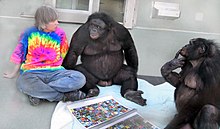
Quick Facts

Biography
Sue Savage-Rumbaugh (born August 16, 1946) is a psychologist and primatologist most known for her work with two bonobos, Kanzi and Panbanisha, investigating their linguistic and cognitive abilities using lexigrams and computer-based keyboards. Originally based at Georgia State University's Language Research Center in Atlanta, Georgia, she worked at the Iowa Primate Learning Sanctuary in Des Moines, Iowa from 2006 until her departure in November 2013. She currently sits on the Board of Directors of Bonobo Hope.
Education
Savage-Rumbaugh received an MS degree at the University of Oklahoma, and completed her doctorate there in 1975. She has been awarded honorary Ph.D.s by the University of Chicago in 1997 and Missouri State University in 2008.
Research


The first and only scientist to conduct language research with bonobos, Savage-Rumbaugh joined Iowa Primate Learning Sanctuary in 2005 following a 23-year association with Georgia State University's Language Research Center (LRC). In 2011, she was recognized as one of TIME magazine's 100 Most Influential People in the World.
At the LRC, Savage-Rumbaugh helped pioneer the use of a number of new technologies for working with primates. These include a keyboard which provides for speech synthesis, allowing the animals to communicate using spoken English, and a "primate friendly" computer-based joystick terminal that permits the automated presentation of many different computerized tasks. Information developed at the center regarding the abilities of non-human primates to acquire symbols, comprehend spoken words, decode simple syntactical structures, learn concepts of number and quantity, and perform complex perceptual-motor tasks has helped change the way humans view other members of the primate order.
Savage-Rumbaugh's work with Kanzi, the first ape to spontaneously acquire words in the same manner as children, was detailed in Language Comprehension in Ape and Child published in Monographs of the Society for Research in Child Development (1993). It was selected by the "Millennium Project" as one of the top 100 most influential works in cognitive science in the 20th century by the University of Minnesota Center for Cognitive Sciences in 1991.
Her view of language – that it is not confined to humans and is learnable by other ape species – is generally criticized and not accepted by researchers from linguistics, psychology and other sciences of the brain and mind. For example, the cognitive scientist Steven Pinker strongly criticized the position of Savage-Rumbaugh and others in his award-winning The Language Instinct, arguing that Kanzi and other non-human primates failed to grasp the fundamentals of language.
According to Alexander Fiske-Harrison, who visited Savage-Rumbaugh in 2001 for the Financial Times, her methods differ from the more clinical techniques of other researchers such as Frans de Waal by taking a "holistic approach to the research, rearing the apes from birth and immersing them in a "linguistic world"."
In September 2012, Savage-Rumbaugh was placed on leave after a group of 12 former employees alleged that she had mistreated the bonobos in her care. However, Savage-Rumbaugh was reinstated in November of that year. Savage-Rumbaugh later left the Iowa Primate Learning Sanctuary, moving to New Jersey, and is embroiled in several legal battles with the Ape Cognition and Conservation Initiative (the successor to the Primary Learning Sanctuary).
